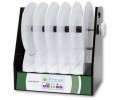Authors
B. Haelewyn, T. Freret, E. Pacary, P. Schumann-Bard, M. Boulouard et al.
Lab
CNRS UMR 6185 CYCERON, University of Caen Basse-Normandie, Caen, France.
Journal
Behavioural Brain Research
Abstract
Excitotoxic lesion of the striatum provides a useful model for evaluating the excitotoxic processes involved in neurological disorders, in particular stroke diseases. The behavioural outcome after such injury is however poorly described. We have therefore investigated the potential behavioural deficits induced by a NMDA-induced excitotoxic unilateral lesion of the lateral part of the striatum, by comparison with a PBS striatal injection (sham procedure), and non-operated mice behaviour. Three groups of male adult Swiss mice were constituted: unilateral NMDA (20 nmol striatal NMDA injection), sham (striatal PBS injection), and control (healthy non-operated mice). From 14 to 29 days post-surgery, sensorimotor and mnesic tests were performed in all groups. After euthanasia, immunohistochemical stainings (NeuN and GFAP) were performed in order to assess the size of the lesion. Straight runway and passive avoidance performances revealed mild deficits related to the excitotoxic NMDA-induced lesion as compared to the sham procedure. Moreover, accelerated rotarod and Morris water maze acquisition performances also revealed deficits related to the surgery, i.e. observed in sham-operated as compared to control mice. NeuN staining revealed no striatal lesion in the sham and non-operated groups in contrast to the NMDA-injected group in which the volume of infarcted striatum was 2.4 ± 0.3 mm3. GFAP staining revealed a glial reaction in the lesioned striatum of NMDA animals and at the PBS injection site in sham animals. These results suggest that NMDA-induced excitotoxic lesion induces subtle long-term behavioural deficits in mice. Moreover, this study shows the importance of the sham group to investigate the behavioural deficits after excitotoxic lesion models in mice.
BIOSEB Instruments Used:
Aron Test or Four Plates Test (LE830),Rotarod (BX-ROD)

 Douleur - Allodynie/Hyperalgésie Thermique
Douleur - Allodynie/Hyperalgésie Thermique Douleur - Spontanée - Déficit de Posture
Douleur - Spontanée - Déficit de Posture Douleur - Allodynie/Hyperalgésie Mécanique
Douleur - Allodynie/Hyperalgésie Mécanique Apprentissage/Mémoire - Attention - Addiction
Apprentissage/Mémoire - Attention - Addiction Physiologie & Recherche Respiratoire
Physiologie & Recherche Respiratoire
 Douleur
Douleur Système Nerveux Central (SNC)
Système Nerveux Central (SNC)  Neurodégénérescence
Neurodégénérescence Système sensoriel
Système sensoriel Système moteur
Système moteur Troubles de l'humeur
Troubles de l'humeur Autres pathologies
Autres pathologies Système musculaire
Système musculaire Articulations
Articulations Métabolisme
Métabolisme Thématiques transversales
Thématiques transversales Bonne année 2025
Bonne année 2025 